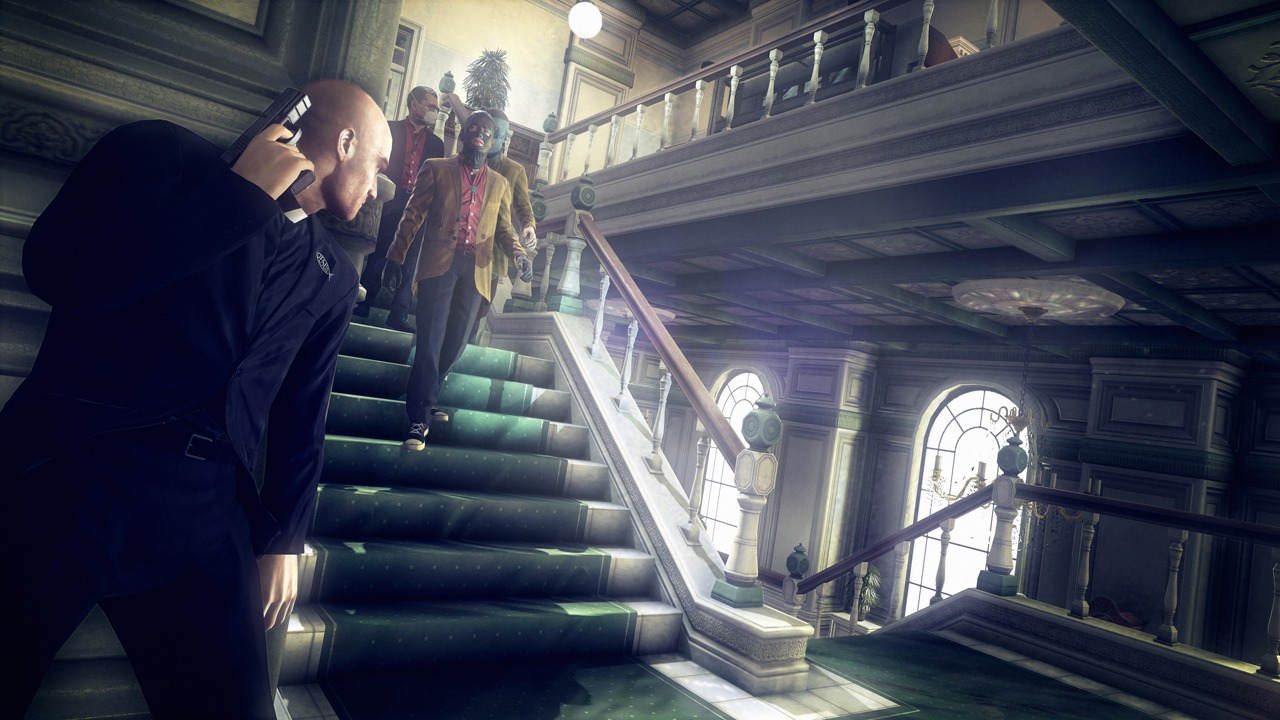Redemption in Absolution: Hitman 3 is at its best when applying the lessons of its messier past
Hitman 3 takes inspiration from the series' black sheep to build its most experimental sandboxes yet

Head to the main menu of Hitman 3, scroll right, and you'll eventually land on a panel promoting last year's remaster of Hitman: Absolution. It's one of the few times you'll find IO's soft reboot explicitly acknowledging the existence of Agent 47's most controversial outing, and can you blame the studio for its silence? Absolution is the entry people often refer to as that Hitman game; the one with the latex nuns, and the Diana shower scene, and the linear gameplay that all future follow-ups have since felt like a direct rebuke against.
But Hitman 3 changes that tune, instead finding a place for Absolution in the chemistry of its gameplay cocktail. This isn't to suggest that IO's latest is a return to the poor man's pulp fiction flavourings of its forbearer (and thank goodness for that), but Hitman 3 takes one of the weakest aspects of Absolution – its overbearing story – and uses it as a springboard for more considered innovation and experimentation. The result is a Hitman experience that still feels fresh, even this far into a series that has remained relatively unchanged for the last half decade.
Dealing in absolutes


More than just a mini Monster Hunter, Little Devil Inside leads a new wave of PS5 indies
2016's Hitman and its sequel, Hitman 2, maintain a strict separation between plot and play, where the former rarely impedes on the moment-to-moment rhythms or structure of the latter. Sure, there's an overarching narrative conveyed through a steady drop of cutscenes, but that narrative never really spills over into IO's sandboxes. They are designed as airtight vignettes of sorts, able to be enjoyed on their own without having to worry about the events leading up to them, hence the episodic structure.
Hitman 3 sticks to that narrative 'cordon sanitaire' for its first two missions, but then the trilogy's arch-antagonist, Providence, gets the upper hand in Agent 47's efforts to take them down. All of a sudden, your handler Diana is nowhere to be seen, and two of Hitman's defining systems, Planning and Mission Stories, are robbed from 47 without warning.
The following chapter, Berlin, is thus unlike anything we've seen from Hitman before, as 47 must eliminate several other hitmen attempting to hunt him down within a German nightclub. There's no Diana in his ear to suggest assassination opportunities, no Silverballer handguns hidden in his suit jacket, and not even a decent idea of what his targets look like.

In other words, Hitman 3's story beats begin to shake up the very foundations of its established rhythms. The stakes of Agent 47's present situation are reflected in the removal of crutches that players will have taken for granted until now, and it's here where the echoes of Absolution are at their loudest. That 2012 title, for better or worse, played more like a linear stealth game than an anthology of murder sim sandboxes, in which IO's ambitious narrative directed the flow and form of its missions.
One sequence has Agent 47 attempting to sneak a girl out of an orphanage. Another has him narrowly escaping a police lockdown – there's even a bit where he drives out to the desert just to interrogate a witness. Hitman spends a strange amount of time in Absolution not being a Hitman, basically; the side-effect of a plot that has too much authority over the rest of the game. As you might imagine, Absolution didn't connect with Hitman fans as well as IO had hoped, which no doubt factored into the studio's return to 47's simulative roots for his latest trilogy.
Weekly digests, tales from the communities you love, and more
But Hitman 3 needed to be more than just a continuation of what worked in the first two games. This is the grand finale to one of the most successful gaming reboots in recent history, after all, not to mention the last Hitman game we're going to play in quite some time, given that IO is trading 47 for 007 with its next project. Hitman 3 thus remixes the established recipe to deliver something that goes beyond more of the same, with its story playing a crucial role as the active ingredient.
Agent of change

"Absolution played more like a linear stealth game than an anthology of murder sim sandboxes."
Berlin isn't the only Hitman 3 mission which takes a page from Absolution's playbook, using the contours of plotting as a force with which to bend its rules of assassination. Without going into spoilers, the game's climax is one of the barmiest missions in the entire franchise to date, but none of it could have feasibly occurred without the context of IO's storytelling explaining it away. Indeed, if it weren't for these subversive, story-driven twists, the only distinguishable evolution of Hitman 3 would be Agent 47's new camera. Thank goodness it wasn't.
Perhaps, after the nine years since Absolution arrived, Hitman 3 shows that IO is finally willing to look back on the lessons learned from its most polarised Hitman outing, recognising its bright spots amongst its darker flaws. Perhaps the studio wanted to use the threequel as an opportunity to flex its storytelling muscles ahead of its date with 007, where narrative will likely become an even more integral part of the experience, and discovered Absolution as a worthwhile point of reference.
Regardless of what the conversations at IO were like during the making of Hitman 3, the result caps off a near-perfect trilogy by successfully bridging the gap between story and gameplay in a way that Absolution inspired, but never quite managed. Congratulations, Agent 47, it's a clean sweep.
For more, check out the best FPS games to escape into right now, or watch our review of The Medium in the video below.
I'm GamesRadar's Features Writer, which makes me responsible for gracing the internet with as many of my words as possible, including reviews, previews, interviews, and more. Lucky internet!



